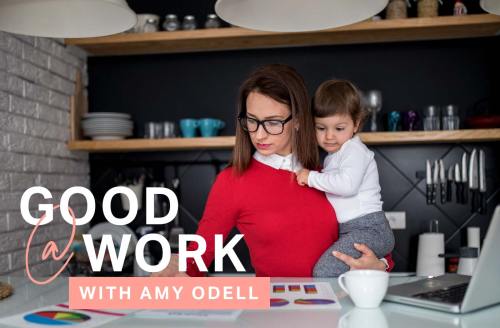How can I focus on work at home—and motivate my team to do the same—while this global crisis swirls?
With everything going on in the world, you may be wondering how to focus on work at home while managing a team of people. Career expert Amy Odell advises.

As the coronavirus pandemic swirls, our collective top priority is staying safe and healthy and doing our part to help stop the spread. This requires staying at home and shifting all of our routines, including professional ones. But how can you focus on work at home during a time like this? In this edition of Good@Work, career expert Amy Odell—whom you may know as the former editor of Cosmopolitan.com and founding blogger of New York magazine’s The Cut—offers several strategies for finding that focus and motivational power to inspire your team while still being authentic to your feelings.
Question:
Right now, it’s hard to feel like much of anything matters beyond the distressing news related to COVID-19. But even under these pandemic conditions—when the state of the world is precarious at best and my personal routine is disrupted—I still need to figure out how to complete my work. After all, I am grateful to still have my job, but mustering the energy to focus on it feels nearly impossible. How can I find that focus to work at home and set a positive example for my team, a group of people that needs me to do a good job so I can motivate them to do the same?
Answer:
Working through a pandemic, the likes of which no one in this lifetime has seen, is not normal. We have to acknowledge that the disruption caused by this global crisis is profound and affects all aspects of life—our whereabouts, our health, our finances, our emotions, and our work, to name just a few. Work, and our ability to devote ourselves to it, simply won’t be normal right now. It probably won’t be normal for a long time from now. We have to acknowledge this and forgive ourselves when our attention unavoidably veers to the news or ill friends and family or simply our own anxiety. We’re human, and of course we’re going to feel distracted by this, no matter how great our self-control is.
That said, obviously work has to get done. Many have lost their jobs or been subject to reduced hours, pay cuts, or furloughs, while others might busier than ever before, dealing with countless urgent issues. Many of these people are at home with children, overseeing a home-schooling situation while trying to maintain their own job requirements. Many business owners are restructuring teams and plans to avoid layoffs or closures, or just trying to stay afloat. Essentially, no matter your situation, there are so many professional-related reasons you may not have the time to tune in to daily press conferences and check the latest news updates online regarding COVID-19 case counts. But, those briefings may be what’s consuming most of your headspace.
I share your struggle to focus on work at home when there is so much distressing news in the world. I wish there were a magic salve for distraction. But I also realize few of us are even in a position to implement a salve. I’m just not able to start a daily yoga or meditation practice or #procrastibake. And I’ve accepted this. My life doesn’t leave me with enough energy to get up at 5 a.m. to write a novel before most people’s days start. I would love to be able to do these things, and I applaud everyone in my Instagram feed who does do them, but between work and caring for my young son and making morning weekday grocery-store runs and finding pockets of time to spend with my significant other, it’s not realistic. And I’m perfectly okay with that.
As leaders, it’s our job to prove ourselves in times of crisis by projecting calm while being as transparent with our employees as possible.
In the absence of a one-stop cure-all for my attention drifts, I have found three thought exercises to help me focus on work at home:
First, as you’ve done, I remind myself of what I have to be grateful for. Call me cheesy, but it’s the easiest and fastest mood-booster I’ve ever found. I’m in a privileged position of having a job, my health, and access to essential supplies. This gratitude practice requires just seconds of time and virtually no effort. Instead of letting my thoughts go down a panic spiral, I recognize that panic spiral, forgive myself for beginning it, and then choose to think about what I do have versus ruminating on uncertainty and things I can’t control.
Second, I remind myself that my behavior and vibe affects others. If you’re a manager, your mood and aura will definitely influence your team. As leaders, it’s our job to prove ourselves in times of crisis by projecting calm while being as transparent with our employees as possible. Now is the time to overcommunicate, because something that reliably creates stress and frustration in employees is feeling like they’re in the dark. Strategize about how you will make them feel like they have a window into your thinking as a manager, and the company’s highest-level decisions. Do they need weekly Zoom calls where you just tell them what’s going on in the company? Twice weekly? Daily? Do you need regular “office hours” where anyone can call you and ask you anything? Check your own personal stress at the door when you enter these sessions. Be calm and friendly, understanding and serious, because your feelings and manner will greatly influence theirs.
And third, try creating news-check breaks during your workday. You can even put them on your calendar. Take 5 or even 20 minutes, once or twice a day, to do nothing but scroll the news, if that’s what you want to do. This way, you’re not forcing yourself to swear it off entirely or trying to do two things at once (like check the news while making a presentation). Research shows that multitasking is one of the least-effective work styles, leading to more mistakes and less overall efficiency. In times when we’re prone to toggling between tabs and devices and work and not-work, we have to be even more mindful of this tendency.
If all else fails—and you find yourself so worried one day that you can’t limit yourself to scheduled news breaks and you’re struggling to engage calmly with your coworkers—try to commit to just a single hour to focus on work at home. Mute all alerts and distractions for just an hour of your day, and try to be as productive as possible in those minutes. You may get into your groove and end up working for two hours instead of one, if not longer.
Finally, try to remember that this is temporary. The crisis will last longer than we all want it to, but the world—and our working world—will not be like this forever.

Amy Odell is a journalist and author living in New York. She is the former editor of Cosmopolitan.com, which became one of the most popular and award-winning sites for millennial women during her tenure. She is passionate about mentoring people starting off in their careers. She is from Austin, Texas. Follow her on Twitter, Instagram, Facebook, and sign up for her newsletter here.
Have a career question for Amy? Email us at goodwork@www.wellandgood.com.
Sign Up for Our Daily Newsletter
Get all the latest in wellness, trends, food, fitness, beauty, and more delivered right to your inbox.
Got it, you've been added to our email list.








